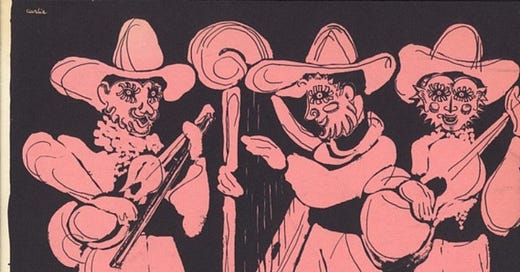EVERY GENRE PROJECT - April 5 - Son jarocho
Genre of the Day - Son jarocho
Album of the Day - Sones of Mexico by Trío Aguilillas (1949)
April 5, 2024
Today’s genre gave us one of the most undeniable bangers of early rock’n’roll—“La Bamba.” Ritchie Valens, the precocious guitarist hailing from Los Angeles who tragically passed at just 17 in an airplane crash, had grown up with the popular song from Veracruz. He was initially hesitant to realize the idea of mixing such a beloved folk standard with the hot new sound of rock’n’roll, but he steamed ahead to wild success. “La Bamba” is a microcosm of the fascinating background of son jarocho in one tiny package.
Even the word bamba probably originates from the word umbaba. Umbaba refers to some sort of rhythm brought to the shores of Veracruz by enslaved Africans. It then proliferated into local and Spanish traditions to create a distinctive fusion sound. Veracruz has the third-highest proportion of those with Afro-Mexican descent among Mexican states, and its proximity to the Caribbean on the Gulf leads to rhythms there reflecting many traditional Afro-Caribbean strains of music much more than in other Mexican states.
Son jarocho is not just defined by this unique rhythmic pattern, but the instruments endemic to the region. The sound includes the gorgeous arpa jarocha, a type of standing harp, and the adorable small guitar-like instruments the jarana jarocha and requinto jarocho. They also use innovative percussion such as the quijada made from a donkey jawbone. In genres predicated off of ensembles in the Americas, it’s rare to find one so inimitable because of the preponderance of instruments primarily used in the region.
Though today’s album was recorded in 1949, the recording still holds up remarkably well over a fast-paced 18 minutes. “La Media Calendra” is the first front-and-center showcase of the unique sound of the plucked arpa jarocha. Throughout the album, the male singer’s unique falsetto is also a particularly well-illustrated hallmark of the genre. “La Patenera” is slightly divergent with what sounds like a fiddle solo injecting unique energy into the son. It’s a brisk listen, but one that’s so enriched by the uncommon mix of instruments that it never wastes a second, with shades ranging from joyous to the mournful ender “Engano.” This album chronicling the history of son jarocho represents it before it took over the world in just three minutes in “La Bamba.” I hope it strikes gold again.





